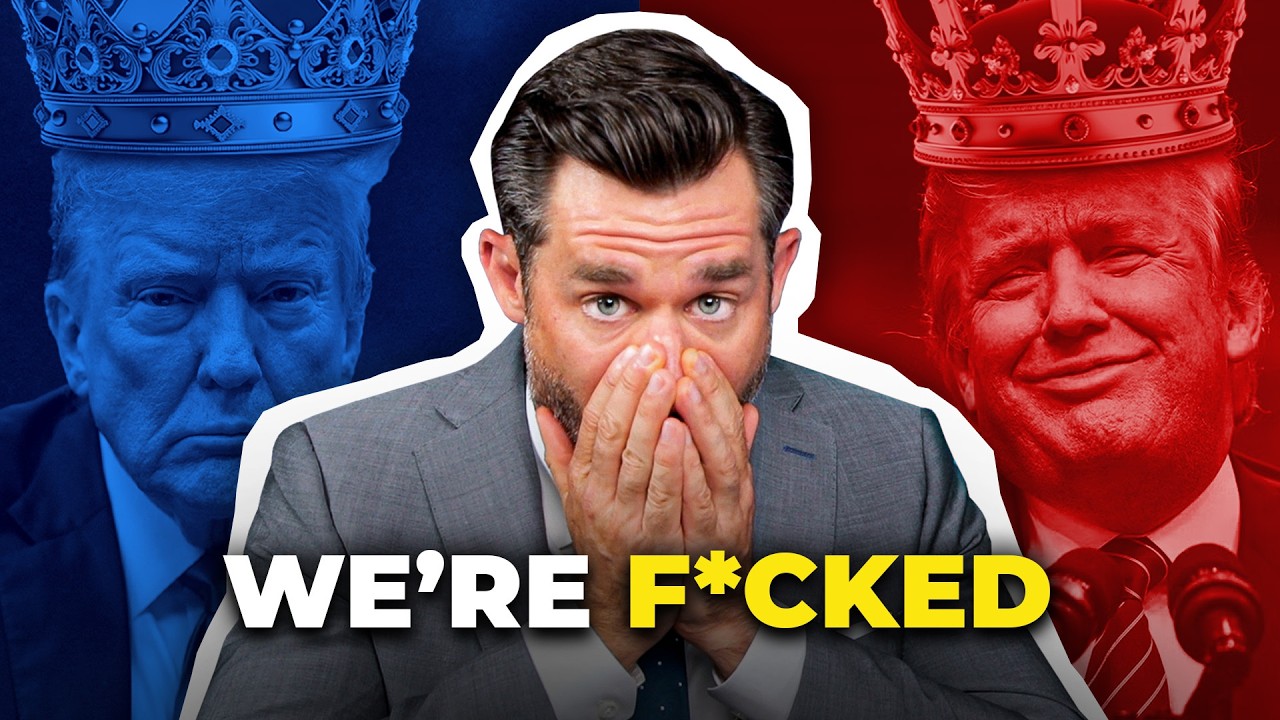66
Trump Is Immune
yt.artemislena.euThis is one of the worst SCOTUS decisions ever. 📰 Get 40% off of Ground News: https://legaleagle.link/groundnews ⚖️⚖️⚖️ Do you need a great lawyer? I can help! https://legaleagle.link/eagleteam
Welcome back to LegalEagle. The most avian legal analysis on the internets.
🚀 Watch my next video early & ad-free on Nebula! https://legaleagle.link/watchnebula
👔 Suits by Indochino! https://legaleagle.link/indochino
GOT A VIDEO IDEA? TELL ME!
▀▀▀▀▀▀▀▀▀▀▀▀▀▀▀▀▀▀▀▀▀▀▀▀▀▀
Send me an email: [email protected]
MY COURSES
▀▀▀▀▀▀▀▀▀▀▀▀▀▀▀▀▀▀▀▀▀▀▀▀▀▀
Interested in LAW SCHOOL? Get my guide to law school! https://legaleagle.link/lawguide
Need help with COPYRIGHT? I built a course just for you! https://legaleagle.link/copyrightcourse
SOCIAL MEDIA & DISCUSSIONS
▀▀▀▀▀▀▀▀▀▀▀▀▀▀▀▀▀▀▀▀▀▀▀▀▀▀
Twitter: https://legaleagle.link/twitter
Facebook: https://legaleagle.link/facebook
Tik Tok: https://legaleagle.link/tiktok
Instagram: https://legaleagle.link/instagram
Reddit: https://legaleagle.link/reddit
Podcast: https://legaleagle.link/podcast
OnlyFans https://legaleagle.link/onlyfans
Patreon https://legaleagle.link/patreon
BUSINESS INQUIRIES
▀▀▀▀▀▀▀▀▀▀▀▀▀▀▀▀▀▀▀▀▀▀▀▀▀▀
Please email my agent & manager at [email protected]
LEGAL-ISH DISCLAIMER
▀▀▀▀▀▀▀▀▀▀▀▀▀▀▀▀▀▀▀▀▀▀▀▀▀▀
Sorry, occupational hazard: This is not legal advice, nor can I give you legal advice. I AM NOT YOUR LAWYER. Sorry! Everything here is for informational purposes only and not for the purpose of providing legal advice. You should contact your attorney to obtain advice with respect to any particular issue or problem. Nothing here should be construed to form an attorney-client relationship. Also, some of the links in this post may be affiliate links, meaning, at no cost to you, I will earn a small commission if you click through and make a purchase. But if you click, it really helps me make more of these videos! All non-licensed clips used for fair use commentary, criticism, and educational purposes. See Hosseinzadeh v. Klein, 276 F.Supp.3d 34 (S.D.N.Y. 2017); Equals Three, LLC v. Jukin Media, Inc., 139 F. Supp. 3d 1094 (C.D. Cal. 2015).
Special thanks:
Stock video and imagery provided by Getty Images and AP Archives
Music provided by Epidemic Sound
Short links by pixelme.me (https://pxle.me/eagle)
Maps provided by MapTiler/Geolayers



I’m aware of the text. I’m also aware of how it’s been interpreted by courts. Those are two very different things.
If you’re aware of the text then why’d you claim the courts’ interpretation gave the President the power of pardon? If you’re aware of the text, why do you consider any interpretation except the obvious one as correct? If you’re aware of the text, why’d you say
Instead of citing any specific thing? I’ll tell you why on that last one: it’s because it’s never been tested, so it hasn’t been interpreted this way before, and this SCOTUS is the only court in the history of the country that would declare an intepretation exactly opposite of what the Constitution says (disagree? Find another instance of it, under another SCOTUS, to prove me wrong).
You are right that
But this is yet another reason the President should never have reason to outright break the law. There is no reason the President should ever have to break the law, and I will hold that position until such time as I get a satisfactory retort otherwise.
Yeah sorry I don’t have a citation handy but I remember hearing interviews with constitutional law experts and scholars in the early days of the Trump presidency that are basically verbatim what I said in my first comment here: “It’s never been tested, but everyone assumes that if a case comes before Scotus, they will rule that the president is immune while carrying out the duties of the office”. All that’s happened recently is Scotus confirmed this assumption. I’m not saying it’s a good thing. Just that it is what most constitutional scholars thought would be the ruling.
It’s why most of the court cases he was battling during his presidency were for things unrelated to his presidency, like his Trump university scam or the Mar A Lago stuff.
Maybe you’re partially remembering the opinion (and it was just an opinion, not legal precedent) that a sitting President cannot be prosecuted for crimes? But the whole basis for that idea was that the proper remedy is impeachment to remove them from office, and upon being removed from office they can be charged with crimes by the DOJ (which they would no longer be the head of). This is what shielded Trump while he was in office, as his DOJ declined to prosecute him citing this logic as the reason.
Yeah that’s probably what I was thinking of. I didn’t realize it was specific to sitting presidents. But then again any criminal trial would be heavily dependant on who the next president is. Like this very well could have played out in the 80s except that Ford pardoned Nixon. I appreciate you helping to refresh my memory.